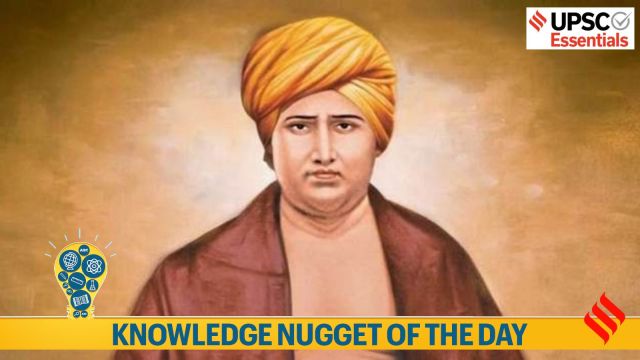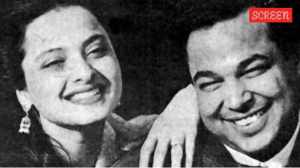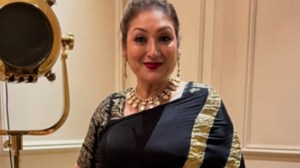Take a look at the essential concepts, terms, quotes, or phenomena every day and brush up your knowledge. Here’s your knowledge nugget for today.
Knowledge Nugget: Dayanand Saraswati & his philosophy
Subject: History
(Relevance: Socio-religious reform movements form an important part of the UPSC syllabus. In 2018, a Prelims question was asked about Dayanand Saraswati. His contribution to the making of modern India is still revered today. Therefore, it is important to study these historical personalities and their contributions from an examination perspective.)

Why in the news?
Today (12th February) marks the 201st birth anniversary of Dayanand Saraswati. In 2023, to commemorate his 200th birth anniversary, a year-long celebration was held across India. Sarvepalli Radhakrishnan, India’s second President, called Dayanand Saraswati ‘a maker of modern India.’ President Droupadi Murmu stated, ‘Swamiji’s ideals deeply influenced great personalities like Lokmanya Tilak, Lala Hansraj, Swami Shraddhanand, and Lala Lajpat Rai. Swamiji and his asādhāraṇa anuyāyī (committed followers) inspired new awareness, spirit, and confidence among the people of India.’”
Key Takeaways:
1. Dayanand Saraswati was born on February 12, 1824, in Morbi, Kathiawar, Gujarat. In 1875, he founded the Arya Samaj to counter social inequities. Arya Samaj is said to have played a crucial role in social awakening through its emphasis on social reforms and education. This was a monotheistic Hindu order that rejected the ritualistic excesses and social dogmas of orthodox Hinduism and promoted a united Hindu society on the basis of Vedic teachings.
2. According to the website of Arya Samaj Houston, the central objectives of Arya Samaj is to, “eradicate Ignorance (Agyan), Indigence or Poverty (Abhav) and Injustice (Anayay) from this earth. This mission is enshrined in the ten Niyams or Principles.” The website says that contrary to the misconception, Arya Samaj is not a religion or a new sect in the Hindu religion.
3. Among his various beliefs included a rejection of idolatry and the overly ritualistic traditions of Hinduism, support for women’s education, denunciation of child marriage, and an opposition to untouchability. “Gandhi himself gave the highest importance to Swamiji’s campaign of abolishing untouchability,” said Murmu.
4. His magnum opus, Satyarth Prakash (1875), emphasised the “return to Vedic principles” that Dayanand Saraswati believed “had been lost” over time. The book uses the language of religious revivalism – hearkening back to a ‘better’ ancient past – in order to fashion a modern religious philosophy and organisation, capable of competing against the increasingly proselytising Christian missionaries. He advocated for worshipping of one Supreme God and followed simple rituals and recitation of Vedic mantras. All other religions were rejected by him and he wanted Hindus who had converted to other religions to return to Hinduism based on the Vedas.
Story continues below this ad
5. He also emerged as an early proponent of cow protection, who first published Gokarun·aˉnidhi , a pamphlet in 1881, which circulated his concerns against cattle slaughter. He later on went to establish a committee for the protection of cows called Gaurakshini Sabha in 1882. He has given economic reason for cow protection arguing that a cow was more beneficial to people alive, as opposed to it being dead, since it gave milk and eased agricultural labour.
6. After he died in 1883 his followers established a school in Punjab in his name – Dayanand Anglo Vedic (DAV) School to educate children in modern subjects and at the same time keep them in touch with their religion and culture. The New Education Policy, of 2020 is seen as taking forward the vision of social reformer Swami Dayanand Saraswati.
| Do you know? |
|
Dayanand Saraswati is credited to have first used the term swaraj (self-rule) in 1875, which would later be picked up by the likes of Lokmanya Tilak and Mahatma Gandhi.
He was also among the first to advocate ‘conversion’ into the Hindu fold – he supported the idea of shuddhi, to bring back Islamic or Christian converts into Hinduism.
|
Philosophy of Dayanand Saraswati
Story continues below this ad
1. Dayanand Saraswati preached respect and reverence for other human beings, supported by the Vedic notion of the divine nature of the individual. Crucial among his “ten founding principles of Arya Samaj” is the idea that all activities must be done for the benefit of humankind as a whole, rather than individuals or even idols and religious symbols.
2. This universalism was directly antithetical to the caste system. While Dayanand did not fully oppose the institution of caste itself, he advocated for significant reform within it. Citing the Vedas, he claimed that caste is not supposed to be hereditary but rather based on an individual’s talents and disposition.
3. Furthermore, he was against the practice of untouchability, which he believed was an outcome of centuries of Brahmanical domination. Crucially, he advocated Vedic education for all castes.
4. His views on women were also against the grain of orthodox Hindu thinking at the time. He campaigned for the education of women as well as against ‘regressive practices’ such as child marriage.
This land of Kathiawar has given birth to many mahantam saputs (greatest of good sons) of Bharatmata. In generations after Maharshi Dayanand Saraswati, Mahatma Gandhi was born in this very region. Swamiji took up the task of social reform and wrote the immortal book entitled Satyarth Prakash for satya ki siddh karne ke liye (establishment of truth). Mahatma Gandhi, on the other hand, sought people’s participation in politics, provided it moral compass and wrote autobiography called My Experiments with Truth.
President Draupadi Murmu
Story continues below this ad
BEYOND THE NUGGET: Swami Shraddhanand
 Stamp of Swami Shraddhanand. (Wikipedia commons)
Stamp of Swami Shraddhanand. (Wikipedia commons)
1. Mahatma Munshi Ram, known as Swami Shraddhanand, was a follower of Dayanad Saraswati who was assassinated by a man called Abdul Rashid on December 23, 1926.
2. Shraddhanand was born on February 22, 1856 in the village Talwan in Jalandhar district in Punjab province. Sometime in the early 1880s, he came into contact with Swami Dayanand, the founder of the Arya Samaj. This meeting was a turning point in his life.
3. Shraddhanand wrote a book called “Hindu Sangathan”. In the book’s introduction, he has written, “In the following pages an attempt has been made to describe the history of the Hindu decline and to trace the causes which led to its present deplorable downfall. As a corollary an attempt has been made to show the way to the nation’s emancipation.”
4. He called untouchability a “curse” and a “blot” on the reputations of the Hindus. “Those who enslave and trample under their feet almost one third of their own kith and kin, have no right to complain of the tyranny of the foreigner.”
Story continues below this ad
(Source: Who was Dayanand Saraswati, Who was Swami Shraddhanand, Ncert, ignou, Inspired entire mankind)
Subscribe to our UPSC newsletter. Stay updated with the latest UPSC articles by joining our Telegram channel – IndianExpress UPSC Hub, and follow us on Instagram and X.
🚨Union Budget 2025 special: Click Here to read the February 2025 issue of the UPSC Essentials monthly magazine. Share your views and suggestions in the comment box or at manas.srivastava@indianexpress.com🚨



 Stamp of Swami Shraddhanand. (Wikipedia commons)
Stamp of Swami Shraddhanand. (Wikipedia commons)






























